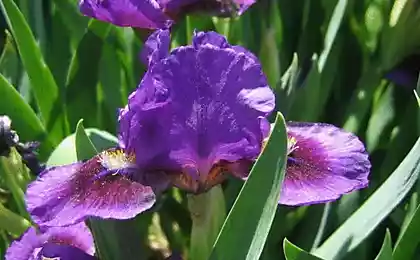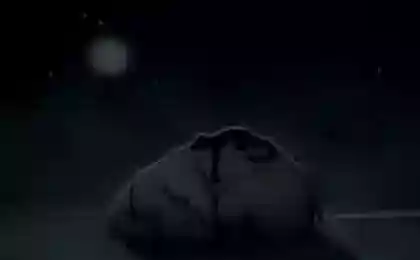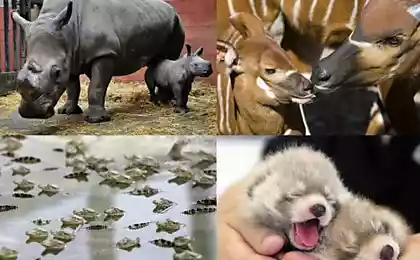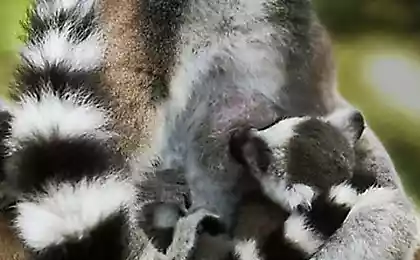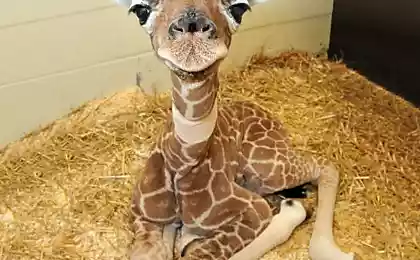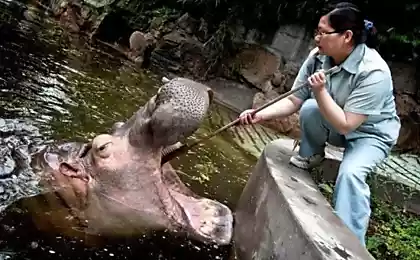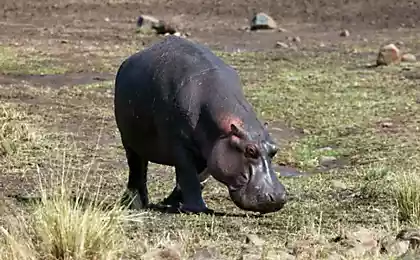162
In Portugal was born a baby dwarf hippopotamus
In the Portuguese zoo Zoo Santo Inácio was born a baby dwarf hippopotamus. The birth of this baby is a great success of the whole team, the zoo website notes.
Photo: Zoo Santo Inácio
To date, dwarf hippos living in West Africa (in Liberia), are in danger of extinction. The main reasons for the decline in the number of this species are deforestation for agricultural land, as well as excessive hunting and prolonged military conflicts.
So far, the newborn behaves very cautiously and does not step away from the mother, who, incidentally, also does not lose sight of her cub. Visitors who began to be allowed to the enclosure with hippos only recently, can watch the baby flounder for hours in a small pool or for his games on the court.
“If something scares her, she immediately tries to hide behind her mother and is shown to the public again only when she calms down a little,” says one of the park rangers. While the baby has no name, but very soon we will announce a competition in which everyone can take.
It is worth noting that today in the wild to meet dwarf hippos (Latin Hexaprotodon liberiensis) is almost impossible. Therefore, zoos and reserves, which contain these cute animals, try to make every effort to increase their numbers, at least in captivity.
The parents of this baby was a female named Romina (Romina), who arrived at the zoo Zoo Santo Inácio in 2006, in 2008 there came a male (father) Kibwana (Kibwana). The pair was created as part of a plan to restore the population of dwarf hippopotamuses and became part of the European Endangered Species Breeding Program (EEP) led by the European Association of Zoos and Aquariums (EAZA).
Although dwarf hippopotamuses spend more time on land than ordinary ones, they also depend on the availability of water bodies, since their skin requires regular baths. According to the latest data, about 3 thousand dwarf hippos remained in their natural habitat, and only about 240 individuals in captivity.
Source: zoopicture.ru
Photo: Zoo Santo Inácio
To date, dwarf hippos living in West Africa (in Liberia), are in danger of extinction. The main reasons for the decline in the number of this species are deforestation for agricultural land, as well as excessive hunting and prolonged military conflicts.
So far, the newborn behaves very cautiously and does not step away from the mother, who, incidentally, also does not lose sight of her cub. Visitors who began to be allowed to the enclosure with hippos only recently, can watch the baby flounder for hours in a small pool or for his games on the court.
“If something scares her, she immediately tries to hide behind her mother and is shown to the public again only when she calms down a little,” says one of the park rangers. While the baby has no name, but very soon we will announce a competition in which everyone can take.
It is worth noting that today in the wild to meet dwarf hippos (Latin Hexaprotodon liberiensis) is almost impossible. Therefore, zoos and reserves, which contain these cute animals, try to make every effort to increase their numbers, at least in captivity.
The parents of this baby was a female named Romina (Romina), who arrived at the zoo Zoo Santo Inácio in 2006, in 2008 there came a male (father) Kibwana (Kibwana). The pair was created as part of a plan to restore the population of dwarf hippopotamuses and became part of the European Endangered Species Breeding Program (EEP) led by the European Association of Zoos and Aquariums (EAZA).
Although dwarf hippopotamuses spend more time on land than ordinary ones, they also depend on the availability of water bodies, since their skin requires regular baths. According to the latest data, about 3 thousand dwarf hippos remained in their natural habitat, and only about 240 individuals in captivity.
Source: zoopicture.ru
